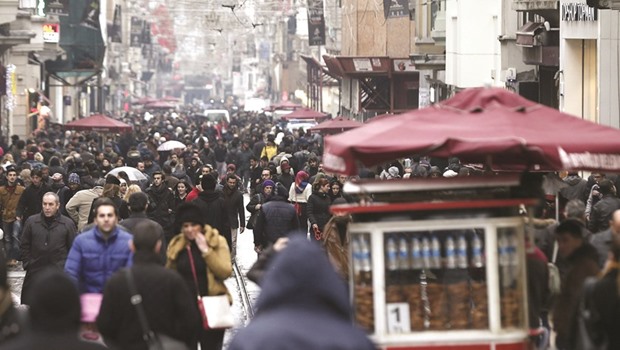Unfazed by political uncertainty and rising violence, Turkey’s consumers last year drove one of the fastest economic expansions in the world.
The economy grew 5.7% in the fourth quarter of 2015, the highest among the G20 group of nations after China and India, according to data compiled by Bloomberg. Household consumption rose 4.7% as families increased spending on everything from clothing to housing and dining out, the government statistics bureau said yesterday.
The lira rose after the data release and was trading 0.5% higher at 2.8215 per dollar at 2.12pm in Istanbul.
Combined public and private expenditures make up more than 80 of the nation’s $720bn gross domestic product, and how they fare determines the overall direction of the economy. The two accounted for more than three quarters of the expansion in the October-to-December period. While emerging nations such as Brazil and Russia face slowdown or recession, strong growth performance shows “the underlying durability of the Turkish economy, which continues to defy its critics,” according to Tim Ash, head of emerging-market strategy at Nomura International in London.
“Many people also assumed that the Turkish economy would slow last year in respect to the security risks,” Ash said by e-mail after the release. “But in the event, Turks continued to spend and invest.”
Turkish politics were roiled by the ruling AK Party’s loss of its parliamentary majority in June for the first time since it came to power in 2002, and the calling of a revote half a year later, where it regained control of the legislature. Meanwhile, a three-year truce with the autonomy-seeking Kurdish group PKK came to an abrupt end, and Kurdish and Islamist militants bombed Ankara and Istanbul.
Defying the political turmoil and violence, growth accelerated in the last three months of the year from 3.9% in the third quarter of 2015, beating the median estimate of 5% in a Bloomberg survey of 11 analysts. Among the G20, it was exceeded only by 7.3% expansion in India and 6.8% in China. Seasonally adjusted output rose 0.7% from the previous quarter.
Uncertainty over the future of the economy between the two general elections may have encouraged private consumption, according to Muhammet Mercan, ING Bank’s Istanbul-based chief economist in Turkey. Government expenditures on goods and services as well as salaries rose by 8.1%, the fastest expansion since the first quarter of the previous year, according to official data.
The rise in consumption may also have been fuelled by “the ongoing refugee influx,” according to Morgan Stanley analyst Ercan Erguzel. Turkey is home to more than 2mn Syrians and Iraqis who have fled their countries amid war and attacks by Islamic State.
Not everyone agrees that the surge in spending was necessarily a good thing.
“Rising consumption is desirable for developed economies that are trying to stoke inflation and revive growth,” said Enver Erkan, an analyst at ALB Forex in Istanbul. “Inflation driven by demand isn’t something that Turkey needs at the moment.” He cited accelerating inflation from 7.6% to 8.8% during the last three months of 2015, far above the central bank’s 5% target.
The lira’s weakness in 2015 reduced GDP in current dollar terms. The size of Turkey’s economy in current prices was $720bn in 2015 compared with nearly $800bn a year earlier, Turkstat said.

People walk on Istiklal Street on a rainy day in Istanbul. The economy grew 5.7% in the fourth quarter of 2015, the highest among the G20 group of nations after China and India, according to data compiled by Bloomberg.
